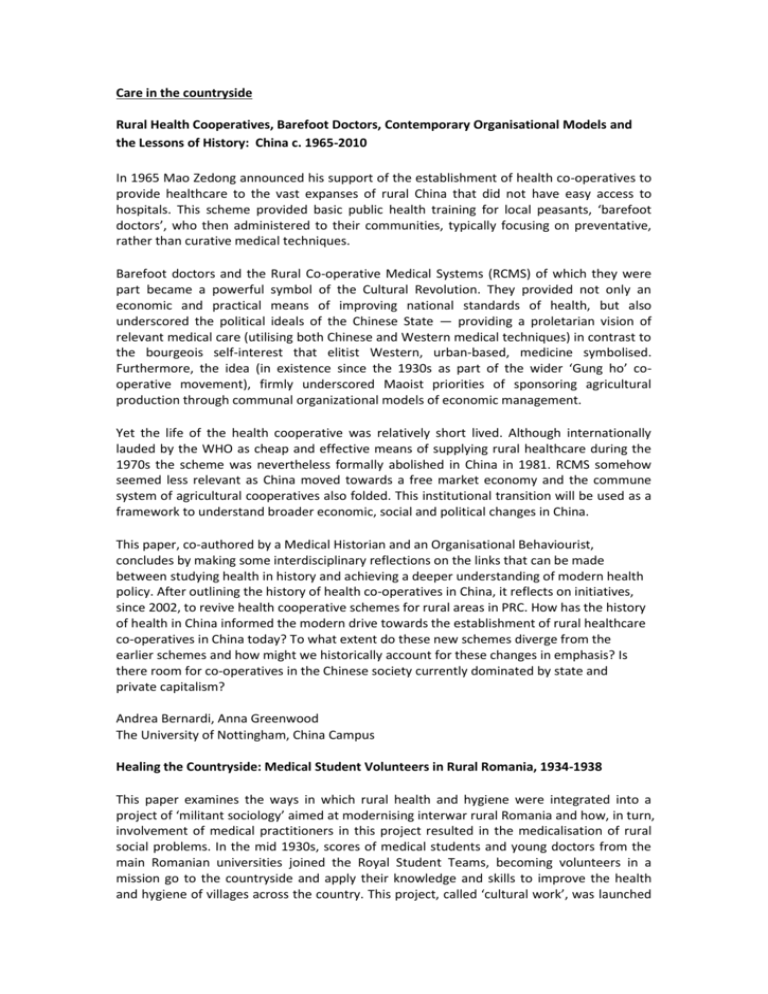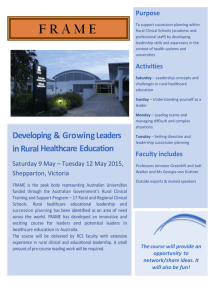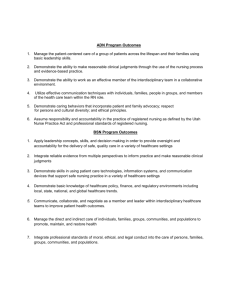Care in the countryside
advertisement

Care in the countryside Rural Health Cooperatives, Barefoot Doctors, Contemporary Organisational Models and the Lessons of History: China c. 1965-2010 In 1965 Mao Zedong announced his support of the establishment of health co-operatives to provide healthcare to the vast expanses of rural China that did not have easy access to hospitals. This scheme provided basic public health training for local peasants, ‘barefoot doctors’, who then administered to their communities, typically focusing on preventative, rather than curative medical techniques. Barefoot doctors and the Rural Co-operative Medical Systems (RCMS) of which they were part became a powerful symbol of the Cultural Revolution. They provided not only an economic and practical means of improving national standards of health, but also underscored the political ideals of the Chinese State — providing a proletarian vision of relevant medical care (utilising both Chinese and Western medical techniques) in contrast to the bourgeois self-interest that elitist Western, urban-based, medicine symbolised. Furthermore, the idea (in existence since the 1930s as part of the wider ‘Gung ho’ cooperative movement), firmly underscored Maoist priorities of sponsoring agricultural production through communal organizational models of economic management. Yet the life of the health cooperative was relatively short lived. Although internationally lauded by the WHO as cheap and effective means of supplying rural healthcare during the 1970s the scheme was nevertheless formally abolished in China in 1981. RCMS somehow seemed less relevant as China moved towards a free market economy and the commune system of agricultural cooperatives also folded. This institutional transition will be used as a framework to understand broader economic, social and political changes in China. This paper, co-authored by a Medical Historian and an Organisational Behaviourist, concludes by making some interdisciplinary reflections on the links that can be made between studying health in history and achieving a deeper understanding of modern health policy. After outlining the history of health co-operatives in China, it reflects on initiatives, since 2002, to revive health cooperative schemes for rural areas in PRC. How has the history of health in China informed the modern drive towards the establishment of rural healthcare co-operatives in China today? To what extent do these new schemes diverge from the earlier schemes and how might we historically account for these changes in emphasis? Is there room for co-operatives in the Chinese society currently dominated by state and private capitalism? Andrea Bernardi, Anna Greenwood The University of Nottingham, China Campus Healing the Countryside: Medical Student Volunteers in Rural Romania, 1934-1938 This paper examines the ways in which rural health and hygiene were integrated into a project of ‘militant sociology’ aimed at modernising interwar rural Romania and how, in turn, involvement of medical practitioners in this project resulted in the medicalisation of rural social problems. In the mid 1930s, scores of medical students and young doctors from the main Romanian universities joined the Royal Student Teams, becoming volunteers in a mission go to the countryside and apply their knowledge and skills to improve the health and hygiene of villages across the country. This project, called ‘cultural work’, was launched in 1934 by the sociologist Dimitrie Gusti and was funded by King Carol II. Based on Gusti’s social theory, this targeted four main areas: the body, the work, the mind and the soul of the peasant. Specialists from academic disciplines corresponding to these areas were recruited to work in individual villages: a doctor and a sports teacher for the body, an agronomist, a vet and domestic scientist for health and work, and a priest and a teacher for the mind and the soul. Comparing the textbooks and rules of cultural work with the field reports of the medical students and doctors, this paper examines both the organisers’ official agenda on rural health and the hygiene and the participants’ experiences and interpretations of their mission. My main argument is that the presence of medical practitioners in the teams exerted a strong influence on the wider project, resulting in a ‘medicalised vision’ of the rural world in general and of the peasant body in particular. As doctors became aware of the social context of rural health and hygiene, the other members of the teams used a medical vocabulary to understand the social problems they confronted. Raluca Mușat, School of Slavonic and Eastern European Studies, UCL Non-specialist health workers in the delivery of mental health care in India: an historical perspective In India, the gap between those who need mental health treatment and those who get it is large and there are too few psychiatrists to cope with this burden. The National Mental Health Programme of India (initiated in 1982) and several important international documents and programmes over the past four decades, have called for an increase in the use of non-mental health specialists to address this treatment gap. This paper, based on oral history interviews with key informants, will analyse the recent history of mental health policy making in India. The research focuses specifically on past efforts and barriers to shifting mental health tasks from specialists (psychiatrists, psychiatric nurses/social workers) to non-mental-health-specialists within primary health care. These can be physicians, nurses, and lay health workers who have some training/duties within mental health care. Thirteen oral history respondents so far interviewed as part of a PhD thesis, were chosen to represent a wide range of views on community mental health developments from postindependence (1947) to the current mental health programme. These included people ‘from within’ the policy arena (policy makers, bureaucrats) and observers (those who had worked/were working within local or international programmes). Informants were chosen from different stages over time in policy making. The interviews have been assessed in the context of other material on mental health policy such as published reports. The study suggests there have been several stages in the development of community and primary mental health care and in the use of non-mental health specialists. Factors influencing the lack of development of non-specialist care appear to have included political or professional apathy or obstruction. But other issues have helped the non-medical developments: recent increasing political and financial support; and the growth of the rights-based movement and of the NGO sector in the 1990s. These prior experiences will, it is hoped, inform national and district mental health policy and programmes in India today. N. van Ginneken, V. Berridge and V. Patel (LSHTM) Anglo-American relations and public health nursing in the East of the British Empire The Director for the East for the International Health Board of the Rockefeller Foundation, embarked on ‘world trips’ examining healthcare in Asia from the 1910s to 1930s. His candid accounts provide an extraordinary comparative perspective of healthcare in British colonies in East and South East Asia, including nursing policy and practice. Not only did the RF critique British colonial healthcare provision, but the organisation also collaborated with colonial governments. Public health nursing was of major importance to the strategy of the IHB, which attempted to influence British colonial healthcare policies in this area. One case study, the Rural Sanitation Campaign in the Straits Settlements, British Malaya, from 1925-28, will be explored in detail. Two nurses from the Overseas Nursing Association in Britain were funded by the RF to study public health nursing in the United States in order to spread what the RF perceived as a more developed American professional expertise into the British Empire. This paper will contextualise the RF approach to British nursing as symptomatic of a broader 'Americanisation' strategy. We shall argue that influencing British nursing in key strategic sites was seen as a 'gateway' to the empire and securing the cultural dominance of American nursing throughout the nursing world. Dr Rosemary Wall and Professor Anne Marie Rafferty, King’s College London





